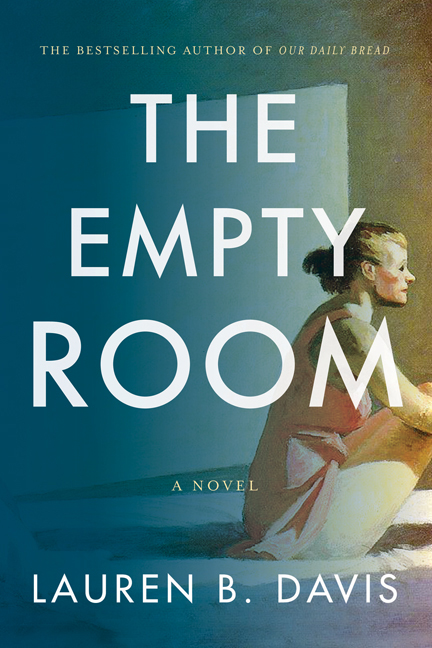The Empty Room
 Title: The Empty Room
Title: The Empty RoomBuy the Book: Amazon, Indigo
Published by: HarperCollins Publishers Ltd
Release Date: May 21, 2013
Pages: 200
ISBN13: 978-1443418294
Synopsis
Colleen Kerrigan wakes up sick and bruised, with no clear memory of the night before. It’s Monday morning, and she is late for work again. She’s shocked to see the near-empty vodka bottle on her kitchen counter. It was full at noon yesterday; surely she didn’t drink that much last night? As she struggles out the door, she fights the urge to have a sip, just to take the edge off. But no, she’s not going to drink today.
But this is the day Colleen’s demons come for her. A very bad day spirals into night as a series of flashbacks take the reader through Colleen’s past—moments of friendship and loss, fragments of peace and possibility. The single constant is the bottle, always close by, Colleen’s worst enemy and her only friend.
In this unforgettable work, acclaimed novelist Lauren B. Davis has created as searing, raw and powerful a portrayal of the chaos and pain of alcoholism as we have encountered in fiction. Told with compassion, insight and an irresistible gallows humour, The Empty Room takes us to the depths of addiction, only to find a revelation at its heart: the importance and grace of one person reaching out to another.
THE PEN AND THE BOTTLE— Watch Lauren interviewed by The Agenda's Steve Paiken on TVO
Please click here to watch Lauren do a jazz-accompanied reading from THE EMPTY ROOM at the Kingston Writersfest 2013
Click here to see Shelagh Rogers of CBC talking about THE EMPTY ROOM
Praise
THE EMPTY ROOM has been named as one of the National Post's "Favourite Books of 2013", the Winnipeg Free Press, Amazon's "Best Books of 2013: Top Editors' Picks" (#22) AND "Best of 2013: Canadian Fiction and Literature" (#12) as well as one of the "Critics Picks" from Halifax's THE COAST.
"The Empty Room is an entirely accurate portrait of alcoholism… real... believable. Davis is without a doubt an exceptionally talented writer."
Globe & Mail"Davis’ novel is raw and disturbing, yet we keep reading, spurred by the clarity of the writing and intensity of the description. Davis offers a completely believable picture of one woman’s decline and helplessness. She makes us feel we are inside Colleen’s skin, guaranteeing our empathy. As a writer, Davis has the rare ability to mine her own experience and create fiction from what she palpably understands. It is an enviable talent and her novel allows those of us who have never been there to grasp the hell of being an addict, of how sorry things can get when we waste our lives. The Empty Roomis scary in places, touching, and often sad. It is a great psychological portrait of a woman under the influence."
The Toronto Star"Davis heartbreakingly renders the disturbed thought process of someone trapped in addiction."
The Quill & Quire"Truly this is a novel of the absolute highest literary quality. Davis has been long-listed for The Giller Prize before. If The Empty Room does not make it at least that far, I will eat my pen."
Hubert O'Hearn, By the Book Reviews
Backstory
I write about what obsesses me, that proverbial pebble in my shoe. In this case, as someone granted a daily reprieve from the horrors of alcoholism for the past 18 years (just like thousands of others I’ve met leading joyous and useful lives), I can’t help but wonder why I have survived and others didn’t make it. My two step-brothers, for example, committed suicide as a direct result of this disease. I also frequently question what might have happened to me had I not stopped drinking.
Excerpt
GOOD MORNING WORLD
It was Monday morning, and Colleen Kerrigan woke up wondering why she was chewing on a dirty old sock. She tried to pull her tongue from the roof of her mouth; it peeled away, dry and swollen. Her fingers told her she didn’t actually have a sock in there, which was something of a relief. She must have been sleeping with her mouth open, probably snoring like a wildebeest. The late-October sun butting up against the window barely made a dent in the murk. She rarely shut the curtains because her eighth-floor window looked out onto the parking lot and the old Dominion Coal and Wood silo. Besides, who wanted to peek into the windows of a nearly-fifty-year-old woman? The man’s voice on the radio said the high today would be seven degrees Celsius, with a brisk wind and the possibility of showers. His voice was sharp and irritatingly upbeat. She shut off the clock radio with the slap of her hand and dragged her legs over the side of the bed, her head fuzzy, her stomach churning. She had slept in her T-shirt and sweatpants, which she hadn’t intended. In fact, she didn’t exactly remember going to bed. She hadn’t even bothered to take off her bra and the wire must have dug into her left breast as she slept. It hurt. Or maybe it was cancer.
Good morning, world.
Her eyes settled on the framed postcard of Dylan Thomas’s writing shed at Laugharne, which she kept on the bedside table. The tiny room, the whitewashed walls, the simple desk and chair, the photos on the walls, the crumpled bits of paper, the bottle, the astonishing work Thomas created there . . . this was Colleen’s idea of perfection. If she concentrated on the image hard enough, it would manifest itself in her own life. She hadn’t written anything in a long time, but she would again, of this she was sure. Beside the photo lay the Bible. Many of the Psalms she knew by heart. They felt like a doorway—one of many, but one which suited her—into the world of Spirit she was sure lived just beyond her fingertips, just out of reach, but which nonetheless beckoned to her. The Bible was open now to Psalm 38. My wounds are loathsome and corrupt, Because of my foolishness.
Sometimes the Divine had a wicked sense of humour.
As she sat up, her head, and the room, spun. She held onto the bed for a moment until it righted. Was she coming down with something? Her sinuses were painful and her throat a bit sore. An ear infection, perhaps. That would account for the dizziness. Her tongue still felt woollen. Maybe she should just go back to bed and call in sick. But no, she’d taken too many sick days these past few months. She’d need a doctor’s note for any more. Her head ached and her bladder felt about to burst. She limped to the bathroom—her knee was bothering her again—and as she sat on the toilet she noticed new bruises on her legs and arms. Where had they come from? She must fight off the hounds of hell in her sleep. Maybe she sleepwalked? She reached for the toilet paper and her left elbow pinged sharply. She cupped it with her right hand. It was tender, just at the joint. When had she banged that? She was going to have to start taking better care of herself.
When finished she made her way down the hall to the kitchen, where dishes crowded the sink and the yellow linoleum floor stuck to the soles of her feet. She drank club soda from the bottle in great gulps, hoping it would do its work and settle her stomach. The clock on the stove said it was nearly 7:30, which meant she had to rush or she’d never get to work on time. On the counter, next to the hideous green cookie jar with the painted cherries—this had once been her mother’s—stood a vodka bottle. Colleen froze, the club soda bottle still pressed to her lips. Some of it dribbled down her chin and she wiped it away with the back of her hand. She stared at the vodka bottle. She picked it up and jiggled it, hoping it was merely an illusion, some trick of the light making it look nearly empty. It should be at least half full. But no, a mere inch or so sloshed about in the bottom. This simply wasn’t possible. She didn’t drink that much yesterday, surely. She must be losing her mind. She wondered if she’d miss it very much.
She put the bottle down. Yes, she thought, I’ve rather enjoyed my mind. I will not drink today, she vowed.
